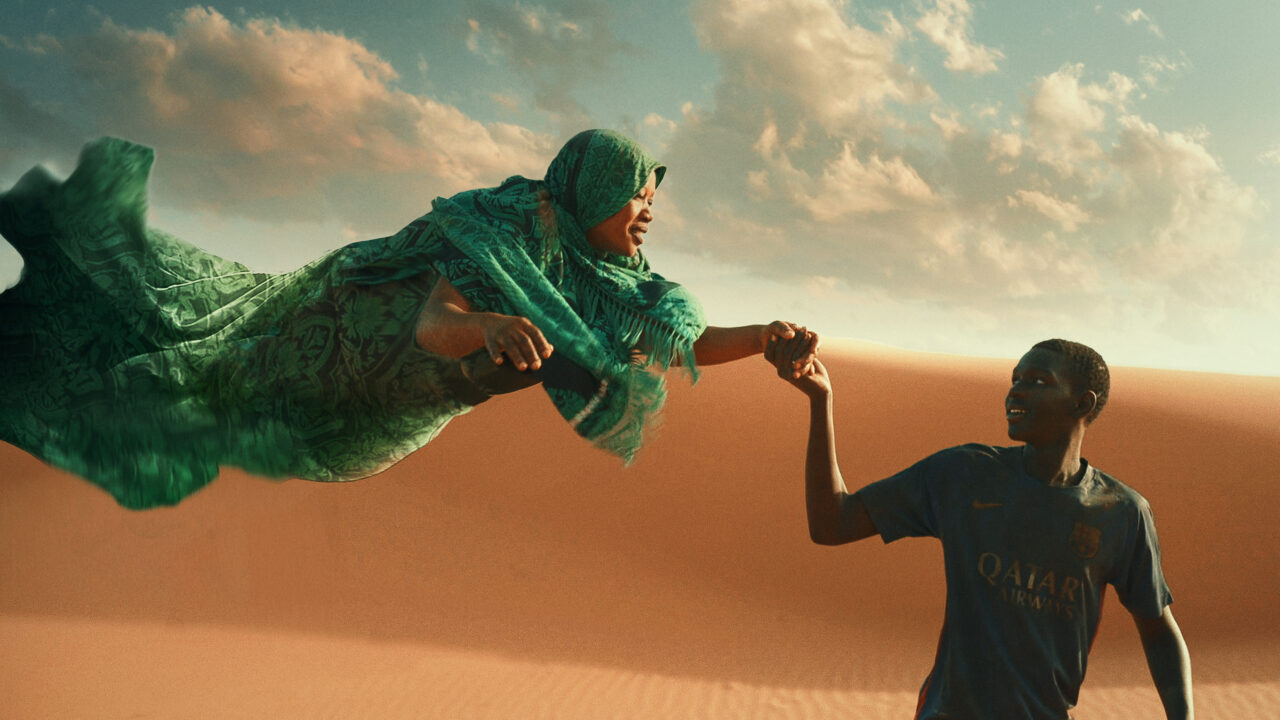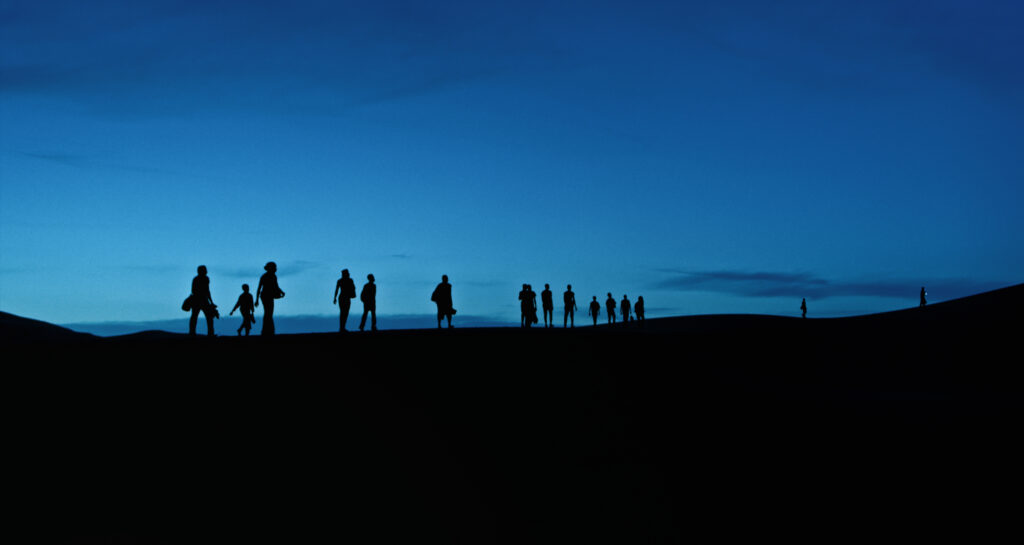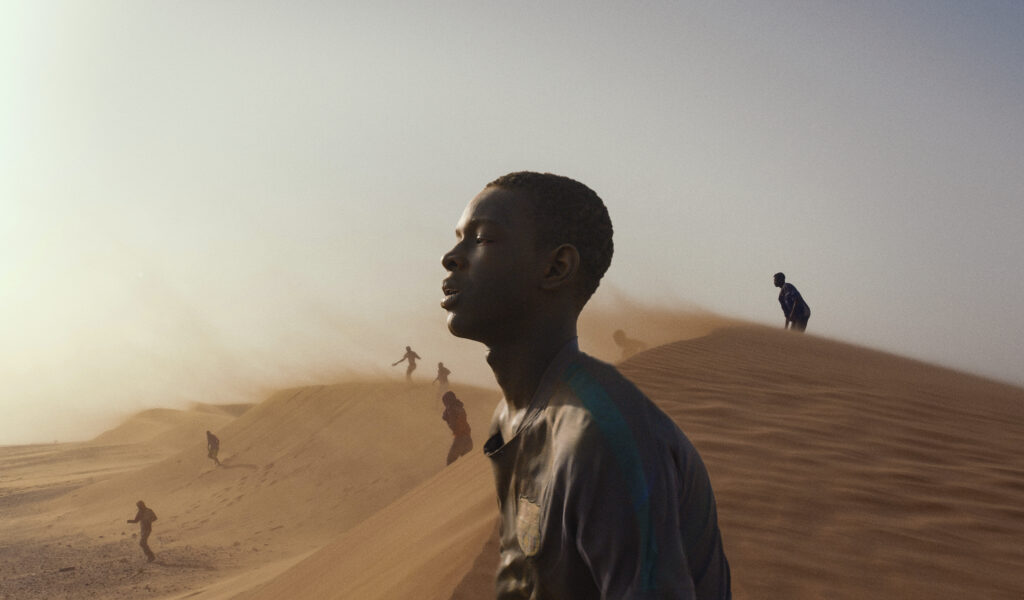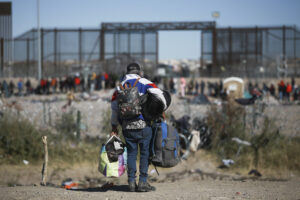The Modern Odyssey of Mass Migration
Matteo Garrone's Oscar-nominated 'Io Capitano' is an epic rendering of two migrants' journey. Ndeye Khady Sy and Seydou Sarr from "Io Capitano." (Image courtesy of Cohen Media Group)
Ndeye Khady Sy and Seydou Sarr from "Io Capitano." (Image courtesy of Cohen Media Group)
In Homer’s “Odyssey,” Odysseus sailed 565 nautical miles from his Greek isle of Ithaca to Troy. In Matteo Garrone’s Oscar-nominated “Io Capitano,” the real-life character Seydou Sarr traverses 2,789 miles by land and sea from Dakar to Sicily. Like the Homeric hero, the Senegalese teenager endures many storm-tossed adventures and perils, including traitorous migrant smugglers, imprisonment, forced labor, torture and treacherous journeys across the Sahara and the Mediterranean Sea, the latter in a rickety ship of dubious seaworthiness filled with desperate African migrants.
“I wanted to show the violence; the violation of human rights; all the things that happen every day, because it’s a page of contemporary history, it’s something that’s happening now.”
The eclectic Garrone is best known for crime dramas such as 2008’s acclaimed “Gomorrah” and 2018’s “Dogman,” as well as a 2019 live-action version of the classic fable “Pinocchio,” with Roberto Benigni as Geppetto. In dramatizing and humanizing the mass migration struggle, he peppers the techniques of Italian Neo-Realism—a cast of nonprofessionals and newcomers, a focus on the plight of everyday people—with a few Felliniesque flights of fancy. The Rome-born Garrone was in Los Angeles campaigning for the Oscar when I interviewed him by Zoom.
Truthdig: Why did you make “Io Capitano”?
Matteo Garrone: The idea comes from the desire to finally give visual form for a part of the journey that we don’t see. We are used to seeing only the last part of the journey to Italy, when the boat arrives at Sicily. But we don’t know anything about all the things that happened before. So, we wanted to make a reverse shot from what we’re used to seeing on the news.
We wanted to see the journey from the point of view of the migrants, so we put the camera on the other side, and give to the audience, finally, the possibility to live an experience, to live the journey subjectively.
To make the movie, it was fundamental to write the movie with the real migrants that made this modern odyssey. On the set, all of the extras were real migrants so they could help me to recreate, together, this world, this adventure. I have been an intermediary. I worked with them, we worked together, we trust each other. I wanted to show the violence; the violation of human rights; all the things that happen every day, because it’s a page of contemporary history, it’s something that’s happening now. In the last 10 years, 30,000 people have died making this journey. It’s a big drama, one of the biggest dramas of our time.

TD: In America, “Io Capitano” has received Academy Award and Golden Globe nominations. How has Italy responded to your film?
MG: In Italy, we had a very incredible response from the audience. The movie is very accessible because it is the journey of the hero. It’s a sort of Homeric fairy tale. I’ve been surprised in a positive way from the incredible number of teachers that have screened the movie, for students of cinema. For me, it’s very important — I hope also here in the States the distributor will work in this direction.
The students, the young, they are our future, it’s a part of the audience that don’t go to see this movie in the theater. Because they think maybe it could be boring, or they’re not interested. But when they see the movie — I know, because I’ve been in front of thousands of students in Italy — they see, first of all, boys of the same age with the same desire, with the same dreams.
“Behind the number there are human beings. And these human beings are exactly like them.”
Passionate about music, the desire to discover the world, the parents that are worried. So, they immediately feel empathy and can follow the adventure and see this drama from a different perspective, and especially understand that behind this number [of undocumented migrants] — like here in the States, with Mexicans or all around the world — we are used to listen to number, number, number, but behind the number there are human beings. And these human beings are exactly like them.
It’s very, very important that the movie — it’s released, of course, in theaters, because it’s accessible to everybody — but also in schools… In France, also, there are lots of schools screening the movie. I’m sorry I’m saying that, maybe it’s not right for the interview, but for me it’s very important.
We also released the movie in 20 countries in Africa. There, the movie is screened to a lot of young students, in the suburbs of Dakar, around Senegal, etc., so they’ll be aware about the risks they are going through [if they take part in undocumented migration]. It’s a movie that has different levels — it’s an adventure movie; a road movie; a coming of age movie. He starts as a boy and became a man.

TD: How are undocumented migrants and refugees treated if they make it to Europe?
MG: That’s very difficult to say, because everybody has a different story — but all are the same, by the way. When they succeed, when they survive, and arrive in Italy, then the destiny is different for everyone. For instance, the story of “Io Capitano” is based on a true story. We combined two or three stories together. So, the last part of the movie, when the boy drives the boat without knowing how to [pilot] the boat, that happened to a boy called [Amara] Fofana, who lives in Belgium. He was 15 when he drove this boat and with a heroic act saved the lives of 250 people, women and children. He was so proud, like you see in the movie, he said: “I’m the captain! I’m the captain!”
And then the movie ends. But after, in the real story, he was jailed as a human trafficker. So, that’s really something that’s a contradiction, because he’s a hero and we put him in jail. But Italy and Europe give money to Libya, because we have [oil] business with them. So, we give to the real traffickers of human beings, that is Libya – often it’s the police – and we put in jail the victim of the system, the hero.
TD: Is Fofana still behind bars?
MG: No. He stayed six months, then he went out. But it was eight years ago when it happened. Now, the law is much tougher. So you can be in jail for 10 years. While we are talking, at this moment, there are a lot of Io Capitano that are in jail as traffickers of human beings, but they are just heroes and captains. Captains by coincidence; they were forced to drive the boat. Sometimes it’s easier to put them in jail, because they don’t have a voice.
TD: In “Io Capitano,” the character Seydou wants to come to Europe to fulfill his dream of becoming a star, a singer. In a way, your movie has made Fofana a real star. In a sense, the character’s dream of becoming a star because he goes to Europe really happened. Fofana, the real captain of the boat – now he is a star, now he is famous.
MG: …Yes, he’s more famous than before. He still lives in Belgium, he works in the airport. Before he was working in the market. He doesn’t have papers, that is why he couldn’t come here [the U.S.]. But he fights, he fights for the rights of the other brothers who are victims of this system of injustice. His life is still very normal. He goes to work in the morning. But he has more visibility than before, so his voice now is louder. So he’ll fight for others who are in the situation he was in before.
TD: Italy’s prime minister, Giorgia Meloni, reportedly admired Mussolini and belongs to the far right Fratelli d’Italia (Brothers of Italy) political party. Since taking power in 2022, how have Meloni’s policies been towards undocumented migrants and refugees? Has she cracked down on them?
MG: I don’t know about that. Because I started to work on this project [more than] two years ago. So it was a movie that started to try to tell the world about the violation of human rights. The fact that we have part of the population who can take a plane and move easily and another part of the population that have to risk their lives for the right we should all have, to move to find a better life. They have to put their life in danger. So, it talks about human rights.
When we released the movie in Italy in September, we got the prize in Venice and a week after, Pope Francis invited us to the Vatican. He wanted to support this movie because he always said that the migrants are contemporary heroes. So, a movie from their point of view was important, and he wanted to support it from the first moment. He screened the movie in the Vatican with the cardinals; it’s like he put his benediction on the movie.
“I’m not confident about the politicians, because they know everything – they know there are people dying in the desert, dying from torture, dying in prison in Libya or Tunisia or dying on the Mediterranean Sea.”
I didn’t have any word from any party, not right or left. The politicos didn’t say anything about the movie. Maybe because the pope supports it? I don’t know. When we screened the movie in the European Parliament on Nov. 15, there was a long standing ovation. They said it was important to show this movie in every school in Europe…
We think the movie is important to help normal people, audiences from every age, to see, from a different point of view, this drama, to be more sensitive about this. But I’m not confident about the politicians, because they know everything – they know there are people dying in the desert, dying from torture, dying in prison in Libya or Tunisia or dying on the Mediterranean Sea. Like they know about the migrants in Mexico and every other part of the world.
So, it’s not that they don’t know — they know, but behind them, there are voters, so, importantly, the direction globally is always going more in the direction of building walls, instead of help.

TD: In Europe there are far right parties opposed to immigration. How would you respond to a European Union citizen who traces his/her ancestry back to ancient Europe and feels that undocumented immigrants are not welcome in their country, do not belong there, should not be supported by European taxpayers and Europeans have their own problems? That Africans and others should go away or stay home and not try to illegally move to Europe?
MG: I would say that first of all, in Europe we are getting older and older. And 70% of their population in Africa is young. So, we can work together. They can help us and we can maybe work with them, with respect for them, and teach them something they can use afterwards in their country. Help us to grow, working with us.
Like, we made the movie together. And now we’re in the five [nominees for the Best International Feature Film] Oscar. Which means we can work together and make good things together. Because when there is respect, when you trust each other, when you don’t try to use the other person, but everybody has dignity, equality, I think this is the right way to go.
“We can work together — that to me is the future. Not walls, open cultural exchange between us.”
Not everybody wants to come to Europe. I was in Senegal and there were, of course, many people who dreamed about coming here. We send to them images with social media that are often not true. They believe that here is a land of toys, everybody’s rich, but when they come they see immediately that there is a background they haven’t seen before. There are a lot of people sleeping in the streets, a lot of poor people.
I don’t think everybody wants to come, but we should also learn a lot from them because in the movie I’ve been with them for months. I was really inspired by their humanity, especially the victims, this joy, this energy, this desire to know the world and do all they can to help their family. We can work together — that to me is the future. Not walls, open cultural exchange between us.
TD: You’ve been to America and know the U.S. a bit. Is there a difference between the attitudes of people in America and Europe regarding mass migration or is it similar?
MG: I don’t know America; I’m here just a few weeks. I don’t know the mentality, the approach of America. From abroad, I feel that America is completely split. It’s divided, there are like two souls. So, it’s difficult for me to talk about what they feel.
In Europe, also, it’s very divided. There are people who are more open to immigration and others, as you said before, they have fear, they think [immigrants] can bring danger. It’s true that it’s a complex problem because you know that integration is not easy; there are problems. But it’s a very important resource for us to have the possibility to have these heroes who want to come to work in our country and help us.
TD: You’ve directed crime dramas, including, notably, “Gomorrah.” How prominent and strong is the mafia today in Italy ?
MG: It’s difficult for me to say. I change genres every time. I don’t know how changed things are. In “Io Capitano,” many times I am reminded of “Gomorrah,” for the realism, elements that are almost documentary-like. There are also elements that remind me of my last movie, “Pinocchio.” So it was a sort of combination between “Pinocchio” and “Gomorrah” in “Io Capitano.”
TD: What’s next?
M.G.: My next movie, I don’t know yet. I’m trying to support “Io Capitano,” trying for it to be seen. That’s the most difficult thing to do when you are in competition for the Academy Award. The difficulty is to be seen. Because it’s very important, the campaign that you can afford. We are trying for the movie to be seen because we are confident about the film we have done. So, I’m focused on this.
In the middle of March, when I will go back to Italy, I’ll start to think about a new movie.
TD: Good luck on Oscar night. We’ll be cheering for you — and all of the migrants.
MG: Thank you very much.
The 121-minute, multi-lingual “Io Capitano” has English subtitles and theatrically opens nationwide on Feb. 23.
Your support matters…Independent journalism is under threat and overshadowed by heavily funded mainstream media.
You can help level the playing field. Become a member.
Your tax-deductible contribution keeps us digging beneath the headlines to give you thought-provoking, investigative reporting and analysis that unearths what's really happening- without compromise.
Give today to support our courageous, independent journalists.






You need to be a supporter to comment.
There are currently no responses to this article.
Be the first to respond.